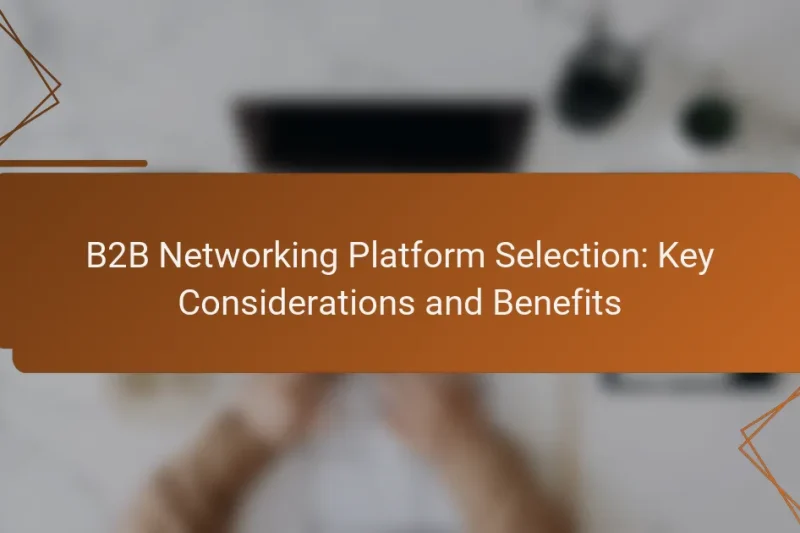B2B networking is essential for small businesses seeking to enhance market access and foster collaboration. By … B2B Networking: Market Access, Collaboration, and Growth for Small BusinessesRead more
B2B networking in emerging markets presents unique opportunities and challenges that require tailored strategies for success. By forming local partnerships, leveraging digital platforms, and engaging in trade events, businesses can effectively navigate these dynamic environments. Understanding cultural norms and building trust are essential for fostering strong relationships that drive growth and collaboration.
B2B Networking Lessons: 7 Insights from Successful Initiatives
In the realm of B2B networking, successful initiatives hinge on the principles of relationship-building, technology utilization, … B2B Networking Lessons: 7 Insights from Successful InitiativesRead more
B2B Networking Metrics: Customer Feedback and Success Measurement
In the realm of B2B networking, key metrics centered on customer feedback and success measurement are … B2B Networking Metrics: Customer Feedback and Success MeasurementRead more
B2B Networking Success: Case Study of the African Tech Ecosystem
The African tech ecosystem is rapidly evolving, with B2B networking playing a crucial role in driving … B2B Networking Success: Case Study of the African Tech EcosystemRead more
B2B Networking in Emerging Markets: Networking Strategies for Entrepreneurs
In emerging markets, effective networking strategies are vital for entrepreneurs seeking to build relationships and drive … B2B Networking in Emerging Markets: Networking Strategies for EntrepreneursRead more
B2B Networking in Emerging Markets: Local Partnerships and Networking Strategies
In emerging markets, effective B2B networking hinges on cultivating local partnerships and employing tailored strategies that … B2B Networking in Emerging Markets: Local Partnerships and Networking StrategiesRead more
B2B Networking in Emerging Markets: Digital Tools, Trust Building and Communication
B2B networking in emerging markets is increasingly reliant on digital tools that facilitate communication and relationship-building. … B2B Networking in Emerging Markets: Digital Tools, Trust Building and CommunicationRead more
B2B Networking Goals: Setting Metrics and Objectives
Effective B2B networking goals are essential for fostering strong business relationships and driving growth. By setting … B2B Networking Goals: Setting Metrics and ObjectivesRead more
B2B Networking Metrics: Assessing Relationship Quality and Success
In the realm of B2B networking, key metrics play a crucial role in evaluating the quality … B2B Networking Metrics: Assessing Relationship Quality and SuccessRead more
B2B Networking Platform Selection: Key Considerations and Benefits
Choosing the right B2B networking platform is crucial for enhancing business operations and fostering valuable connections. … B2B Networking Platform Selection: Key Considerations and BenefitsRead more
What Are the Key Strategies for B2B Networking in Emerging Markets?
Key strategies for B2B networking in emerging markets include forming local partnerships, leveraging digital platforms, participating in trade events, building trust through relationships, and adapting to cultural norms. These approaches help businesses navigate the unique challenges and opportunities present in these regions.
Leveraging Local Partnerships
Establishing local partnerships is crucial for successful B2B networking in emerging markets. Collaborating with local businesses can provide valuable insights into market dynamics, customer preferences, and regulatory environments.
Consider forming alliances with distributors, suppliers, or service providers who have established networks. This can enhance your reach and credibility while minimizing risks associated with market entry.
Utilizing Digital Platforms
Digital platforms play a significant role in B2B networking, especially in emerging markets where traditional methods may be less effective. Utilize social media, professional networking sites, and industry-specific platforms to connect with potential partners and clients.
Investing in a strong online presence can facilitate communication and showcase your offerings. Consider using platforms like LinkedIn for professional connections and local forums for targeted outreach.
Participating in Trade Events
Trade events are excellent opportunities for B2B networking in emerging markets. These events allow businesses to showcase their products, meet potential clients, and establish relationships with industry peers.
Research local trade shows and exhibitions relevant to your industry. Attending these events can provide insights into market trends and competitor strategies while expanding your network.
Building Trust Through Relationships
Trust is a fundamental component of successful B2B networking in emerging markets. Building strong relationships with local partners and clients can lead to long-term business success.
Engage in regular communication, demonstrate reliability, and show commitment to mutual goals. Personal interactions, such as face-to-face meetings, can significantly enhance trust-building efforts.
Adapting to Cultural Norms
Understanding and adapting to cultural norms is essential for effective B2B networking in emerging markets. Each region has its own business etiquette, communication styles, and decision-making processes.
Take the time to learn about local customs and practices. This can include understanding negotiation styles, meeting protocols, and the importance of personal relationships in business dealings. Being culturally aware can significantly enhance your networking success.
How Can Businesses Identify Networking Opportunities?
Businesses can identify networking opportunities by leveraging market research, engaging with local communities, and utilizing social media insights. These strategies help in recognizing potential partners, clients, and industry trends that are vital for growth in emerging markets.
Market Research and Analysis
Conducting thorough market research is essential for identifying networking opportunities in emerging markets. This involves analyzing industry reports, competitor activities, and local economic conditions to pinpoint key players and potential collaborators.
Utilize tools like SWOT analysis to evaluate strengths, weaknesses, opportunities, and threats in the market. This structured approach can help businesses focus on areas with the highest potential for networking and partnership development.
Engaging with Local Business Communities
Connecting with local business communities can provide invaluable insights and networking opportunities. Attend local trade shows, industry conferences, and community events to meet potential partners and clients face-to-face.
Joining local business associations or chambers of commerce can also facilitate introductions and foster relationships. These organizations often host networking events that can lead to fruitful partnerships.
Utilizing Social Media Insights
Social media platforms are powerful tools for identifying networking opportunities. Monitor industry-related discussions on platforms like LinkedIn and Twitter to discover potential contacts and trends.
Engage actively by sharing relevant content and participating in conversations. This not only builds your visibility but also positions your business as a knowledgeable player in the market, attracting like-minded professionals and opportunities for collaboration.
What Are the Challenges of B2B Networking in Emerging Markets?
B2B networking in emerging markets faces several significant challenges, including regulatory barriers, cultural differences, and infrastructure limitations. These factors can hinder effective communication and collaboration between businesses, impacting growth and partnership opportunities.
Regulatory Barriers
Regulatory barriers often complicate B2B networking in emerging markets. Businesses may encounter complex licensing requirements, varying tax regulations, and inconsistent enforcement of laws. For example, navigating import/export regulations can be particularly challenging, leading to delays and increased costs.
To mitigate these issues, companies should invest time in understanding local regulations and consider engaging local legal experts. Establishing relationships with government agencies can also facilitate smoother operations and compliance.
Cultural Differences
Cultural differences can significantly impact B2B networking in emerging markets. Variations in communication styles, negotiation tactics, and business etiquette may lead to misunderstandings. For instance, some cultures may prioritize relationship-building over immediate business discussions, which can affect meeting outcomes.
To bridge these cultural gaps, businesses should conduct thorough research on local customs and practices. Training employees in cultural sensitivity and adapting communication strategies can enhance interactions and foster stronger partnerships.
Infrastructure Limitations
Infrastructure limitations pose a major challenge for B2B networking in emerging markets. Inadequate transportation networks, unreliable internet access, and limited technological resources can hinder effective communication and logistics. For example, delays in shipping due to poor road conditions can disrupt supply chains.
To address these limitations, businesses should evaluate the local infrastructure before entering a market. Building relationships with local logistics providers and investing in technology can help streamline operations and improve connectivity with partners.
How Do Local Regulations Impact Networking?
Local regulations significantly influence networking by shaping the legal landscape in which businesses operate. Understanding these regulations is crucial for forming effective connections and partnerships in emerging markets.
Understanding Compliance Requirements
Compliance requirements vary widely across emerging markets, impacting how businesses can network. Companies must familiarize themselves with local laws regarding data protection, anti-bribery, and trade regulations. For instance, in some regions, businesses may need to register with local authorities before engaging in networking activities.
It's essential to consult local legal experts to ensure adherence to these regulations. Non-compliance can lead to penalties that hinder networking efforts and damage reputations.
Adapting Strategies to Legal Frameworks
Adapting networking strategies to fit local legal frameworks is vital for success. This may involve modifying communication styles, choosing appropriate venues, or utilizing digital platforms that comply with local laws. For example, in countries with strict data privacy laws, businesses should prioritize secure communication channels.
Additionally, understanding cultural nuances in business practices can enhance networking effectiveness. Engaging in local customs and respecting regulatory environments can build trust and facilitate smoother interactions.
What Tools Can Facilitate B2B Networking?
Effective B2B networking in emerging markets relies on various tools that enhance connections and relationship management. Utilizing the right platforms can streamline communication, improve relationship tracking, and facilitate event participation.
LinkedIn for Professional Connections
LinkedIn serves as a vital platform for establishing professional connections in B2B networking. Users can create profiles showcasing their expertise, which helps attract potential partners and clients.
To maximize LinkedIn's potential, engage actively by sharing industry insights, participating in relevant groups, and connecting with individuals in your target market. Regular updates and interactions can significantly enhance visibility and credibility.
CRM Software for Relationship Management
Customer Relationship Management (CRM) software is essential for managing interactions and data throughout the networking process. It helps businesses track leads, manage contacts, and analyze relationship histories.
Choose a CRM that fits your business size and needs, with features like automation, reporting, and integration with other tools. Popular options include Salesforce and HubSpot, which offer scalable solutions for various budgets.
Networking Apps for Events
Networking apps designed for events can facilitate connections among attendees and enhance the overall experience. These platforms often include features like attendee lists, messaging, and scheduling tools.
Consider using apps like Whova or Brella, which allow users to set up meetings and share contact information seamlessly. Ensure that your profile is complete and engaging to attract meaningful interactions during events.
What Metrics Should Businesses Track for Networking Success?
Businesses should track metrics such as connection growth, engagement levels, and conversion rates to gauge networking success. These metrics provide insights into the effectiveness of networking efforts and help identify areas for improvement.
Connection Growth
Connection growth measures the increase in contacts within a network over time. This can include new partners, clients, or industry contacts. A steady growth rate, typically in the range of 10-20% annually, indicates a healthy networking strategy.
To effectively track connection growth, businesses can use customer relationship management (CRM) tools that provide analytics on new connections made through events, referrals, or online platforms. Regularly reviewing these metrics helps businesses stay proactive in expanding their networks.
Engagement Levels
Engagement levels refer to the frequency and quality of interactions with connections. This can include meetings, emails, or social media interactions. High engagement levels often correlate with stronger relationships and can lead to increased business opportunities.
Businesses should aim for consistent engagement, targeting at least one meaningful interaction per connection each month. Tools like LinkedIn can help monitor engagement through insights on post interactions and message responses.
Conversion Rates
Conversion rates measure the percentage of networking connections that lead to tangible business outcomes, such as sales or partnerships. Tracking this metric helps businesses understand the effectiveness of their networking strategies in generating revenue.
A reasonable conversion rate for B2B networking can range from 5-15%, depending on the industry and the quality of connections. Regular analysis of conversion rates can help businesses refine their networking tactics and focus on high-potential connections.














